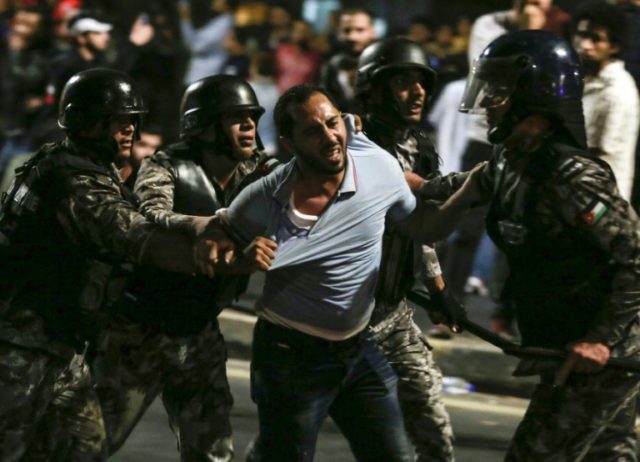Amman (AFP) – Jordan’s senate met Sunday for a special session after another night protests across the country against IMF-backed austerity measures including a draft income tax law and price hikes.
Some 3,000 people faced down a heavy security presence to gather near the prime minister’s office in Amman until the early hours of Sunday morning, waving Jordanian flags and signs reading “we will not kneel”.
Protests have gripped the country since Wednesday, when hundreds responding to a call by trade unions, flooded the streets of Amman and other cities to demand the fall of the government.
Last month, the government proposed a new income tax law, yet to be approved by parliament, aimed at raising taxes on employees by at least five percent and on companies by between 20 and 40 percent.
The measures are the latest in a series of economic reforms since Amman secured a $723-million three-year credit line from the International Monetary Fund in 2016.
The senate convened hours after protests ended Sunday to discuss “ways of dealing with draft law… in the interest of all parties”, Jordan’s official Petra news agency said.
Senate speaker Faisal al-Fayez there was a need for “comprehensive national dialogue” on the law, echoing an earlier call by King Abdullah II.
Fayez said the government should “balance economic challenges and pressures with the interests of different social sectors”, but cautioned against violence and called on authorities to bring “troublemakers” to justice.
Since January, Jordan — which suffers from high unemployment and has few natural resources — has seen repeated price rises including on staples such as bread, as well as extra taxes on basic goods.
The price of fuel has risen on five occasions since the beginning of the year, while electricity bills have shot up 55 percent since February.
The IMF-backed measures have sparked some of the biggest economic protests in five years.
Overnight, protesters outside Prime Minister Hani Mulki’s office shouted slogans including “the ones raising prices want to burn the country” and “this Jordan is our Jordan, Mulki should leave”.
– ‘Snowball’ –
Demonstrators tussled with security forces and some fainted, but others smoked water pipes and one sat on the pavement and played the Arabian lute, or oud.
In another part of the city, security forces used tear gas to prevent hundreds of demonstrators from joining the rally near Mulki’s office, Jordanian news websites reported.
“Women have started looking in rubbish bins to find food for their children, and every day we’re hit by price hikes and new taxes,” said one protester.
Bank employee Mohammad Shalabiya, 28, said demonstrators wanted “to tell the government that the citizen’s income isn’t suitable for this kind of law and that we have a right to demonstrate”.
Lina Rsheidat, 35, a housewife with a red keffiyeh scarf around her neck, said the proposed law was “unjust” and would “harm the Jordanian people”.
According to official estimates, 18.5 percent of the population is unemployed, while 20 percent are on the brink of poverty.
The Economist Intelligence Unit earlier this year ranked Jordan’s capital as one of the most expensive in the Arab world.
“The popular movement… has surprised the government,” Adel Mahmoud, a Jordanian political analyst, told AFP.
Discontent could “snowball… triggering a domestic crisis”, he said, adding that he expected protests to continue until demands are met.
– Struggling economy –
Jordan, a key US ally, has largely avoided the unrest witnessed by other countries in the region since the Arab Spring revolts broke out in 2011, although protests did flare late that year after the government cut fuel subsidies.
But the country has long played host to refugees from neighbouring Iraq, and according to government figures, more than one million people have fled to Jordan from Syria’s devastating seven-year war, further straining its struggling economy.
Amman has repeatedly urged international donors to provide extra funds to help it host them.
On Saturday Mulki met with trade union representatives who demanded the income tax law be revoked, but they failed to reach an agreement.
The head of Jordan’s federation of unions, Ali Obus, demanded the state “maintain its independence and not bow to IMF demands”.
King Abdullah II on Saturday called on parliament to lead a “comprehensive and reasonable national dialogue” on the new tax law.
“It would not be fair that the citizen alone bears the burden of financial reforms,” he told officials.
The IMF says the loan aims at slashing Jordan’s public debt from about 94 percent of GDP to 77 percent by 2021, through “reforms to bolster economic growth and gradual fiscal consolidation”, according to its website.

COMMENTS
Please let us know if you're having issues with commenting.